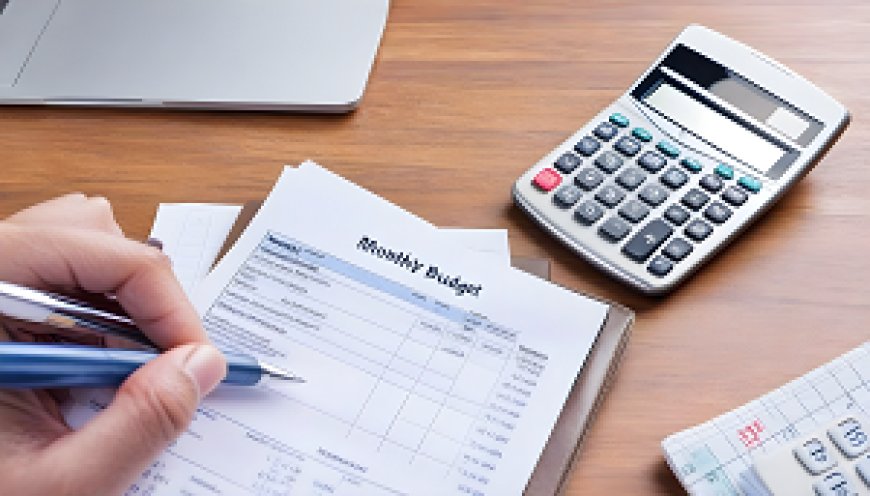How to establish an effective monthly budget
Establishing an effective monthly budget is a crucial step towards achieving financial stability and maintaining control over monthly expenditures. This process begins by examining all available sources of income, accurately identifying monthly revenues. Subsequently, individuals need to identify and categorize all expected monthly expenses, such as rent or mortgage, utility bills, groceries, and entertainment. Allocating a portion of the budget for emergencies and savings is also essential. Utilizing available technology can facilitate tracking spending and analyzing financial data. Understanding strengths and weaknesses in expenditures allows for identifying opportunities to improve financial management and achieve savings or investment goals. Developing an effective budget requires commitment and discipline but serves as a strong foundation for financial control and overall improvement in financial well-being.

Establishing an effective monthly budget is a crucial step towards achieving financial balance and proper control over monthly expenditures. The budgeting process is more than just identifying income and expenses; it is a strategy that enables individuals to gain a better understanding of personal financial matters and set priorities. A budget helps monitor spending, identify gaps in financial planning, and prepare a plan to achieve financial goals. In this introduction, we will explore how creating an effective monthly budget can be a powerful tool for achieving financial stability and improving personal financial management.
Steps to Build a Successful Monthly Budget
Building a successful monthly budget is a critical aspect of effective financial management. A well-constructed budget serves as a roadmap for allocating income, managing expenses, and achieving financial goals. Here are the steps to build a successful monthly budget:
1. Set Clear Financial Goals:
- Define short-term and long-term financial goals. These could include saving for emergencies, paying off debt, or saving for a vacation or retirement.
- Prioritize your goals to focus on what matters most to you.
2. Gather Financial Information:
- Collect information about your income sources. This includes your salary, bonuses, freelance income, and any other sources of revenue.
- Gather details about your fixed expenses, such as rent or mortgage, utilities, insurance, and loan payments.
- List variable expenses like groceries, entertainment, dining out, and discretionary spending.
3. Calculate Total Monthly Income:
- Determine your total monthly income by adding up all your income sources. This provides a clear picture of the money you have available.
4. Identify Fixed and Variable Expenses:
- Differentiate between fixed and variable expenses. Fixed expenses remain constant (e.g., rent, insurance), while variable expenses can fluctuate (e.g., groceries, entertainment).
5. List All Expenses:
- Create a comprehensive list of all your monthly expenses. Break down categories into specific items for a detailed overview.
- Include both essential expenses (needs) and non-essential expenses (wants).
6. Categorize and Prioritize:
- Categorize your expenses into groups such as housing, utilities, transportation, groceries, and entertainment.
- Prioritize your expenses based on importance. Ensure that essential needs are covered before allocating funds to discretionary spending.
7. Create a Realistic Budget:
- Based on your income and expenses, create a realistic budget that balances your financial priorities.
- Allocate specific amounts to each expense category. Be mindful of not exceeding your total income.
8. Factor in Savings and Debt Repayment:
- Allocate a portion of your budget to savings. Include contributions to emergency funds, retirement accounts, and other savings goals.
- Prioritize debt repayment. Include monthly payments for credit cards, loans, and other outstanding debts.
9. Use Budgeting Tools:
- Leverage budgeting tools and apps to streamline the budgeting process. Tools like Mint, YNAB (You Need A Budget), or personal finance apps from banks can help you track spending and stay within budget.
10. Monitor and Adjust:
- Regularly monitor your spending against your budget. This helps identify areas where you may be overspending or where adjustments can be made.
- Be flexible and willing to adjust your budget as your financial situation or priorities change.
11. Emergency Fund Allocation:
- Ensure that your budget includes contributions to an emergency fund. This fund provides a financial safety net for unexpected expenses.
12. Review and Reflect:
- Periodically review your budget to assess your progress towards financial goals.
- Reflect on your spending habits and adjust your budget accordingly.
13. Seek Professional Advice:
- If needed, consult with a financial advisor for personalized guidance. A professional can offer insights, help optimize your budget, and provide strategies for achieving your financial goals.
14. Involve Family Members:
- If applicable, involve family members in the budgeting process. Discuss financial goals and ensure everyone is on the same page regarding spending priorities.
15. Stay Disciplined:
- Stick to your budget with discipline. Avoid unnecessary impulse purchases and be mindful of your financial goals.
- Develop healthy spending habits that align with your budget.
16. Regularly Review and Update:
- Life circumstances, income, and expenses can change. Regularly review and update your budget to ensure it remains aligned with your current situation and goals.
17. Celebrate Milestones:
- Celebrate financial milestones achieved through budgeting. This positive reinforcement encourages continued commitment to your financial plan.
Building a successful monthly budget is an ongoing process that requires dedication and adaptability. By setting clear goals, understanding your financial situation, and creating a realistic budget, you can gain control of your finances and work towards a secure financial future. Regular monitoring and adjustments ensure that your budget remains effective in helping you achieve your evolving financial goals.
Analyzing Income and Categorizing Expenses
Analyzing income and categorizing expenses is a fundamental step in effective financial management. It involves a detailed examination of your earnings and a systematic breakdown of where your money is going. This process provides valuable insights into your financial health, helps you make informed decisions, and enables you to create a realistic budget. Here's a comprehensive guide on analyzing income and categorizing expenses:
Analyzing Income:
-
Identify Sources of Income:
- Start by listing all your sources of income, including your salary, bonuses, freelance work, investment returns, and any other streams of revenue.
- Ensure that you have a clear and accurate understanding of your total monthly income.
-
Calculate Net Income:
- Calculate your net income by subtracting taxes and other deductions from your total income.
- The net income is the actual amount you receive after mandatory deductions.
-
Regular vs. Irregular Income:
- Differentiate between regular and irregular income. Regular income is consistent and predictable, while irregular income may vary each month.
-
Consider Disposable Income:
- Evaluate your disposable income, which is the amount of money you have available for spending and saving after deducting taxes and necessary expenses.
-
Account for Windfalls:
- Include any windfalls or unexpected income, such as tax refunds, bonuses, or gifts. Determine how to allocate or save these funds wisely.
Categorizing Expenses:
-
Fixed vs. Variable Expenses:
- Identify fixed expenses, which remain constant each month (e.g., rent/mortgage, utilities).
- Differentiate variable expenses, which can fluctuate (e.g., groceries, entertainment).
-
Essential vs. Non-Essential Expenses:
- Classify expenses as essential (needs) or non-essential (wants). Essential expenses are necessary for basic living, while non-essential expenses contribute to lifestyle and enjoyment.
-
Create Detailed Categories:
- Break down expense categories into specific items (e.g., groceries, dining out, transportation) for a detailed analysis.
- Use budgeting tools or apps to create a comprehensive list of spending categories.
-
Regular Bills and Irregular Expenses:
- Distinguish between regular monthly bills (e.g., rent, utilities) and irregular but predictable expenses (e.g., annual subscriptions, vehicle maintenance).
- Allocate funds for irregular expenses by setting aside a portion of your budget.
-
Debt Repayment:
- Categorize debt repayments separately. Include credit card payments, loans, and any other outstanding debts in your analysis.
-
Emergency Fund Contribution:
- Allocate a portion of your income to contribute to your emergency fund. Treating this as a fixed expense ensures ongoing financial security.
-
Savings and Investments:
- Create categories for savings and investments. Allocate funds for short-term goals (e.g., vacations) and long-term goals (e.g., retirement).
-
Review Recurring Subscriptions:
- Regularly review and categorize recurring subscriptions (e.g., streaming services, gym memberships). Eliminate or adjust subscriptions that are no longer serving your needs.
Benefits of Analyzing Income and Categorizing Expenses:
-
Financial Awareness:
- Gain a clear understanding of your financial situation by analyzing income and categorizing expenses.
- Identify areas of strength and opportunities for improvement in your financial management.
-
Informed Decision-Making:
- Make informed decisions about spending and saving based on a detailed breakdown of your income and expenses.
- Prioritize areas for adjustment or optimization.
-
Budget Creation:
- Use the insights gained to create a realistic and achievable budget. A well-structured budget serves as a roadmap for managing your finances effectively.
-
Identifying Trends:
- Identify spending trends over time. This helps you recognize patterns, make necessary adjustments, and plan for future financial goals.
-
Emergency Preparedness:
- By categorizing expenses, you can allocate funds to build and maintain an emergency fund. This fund provides a financial safety net in times of unexpected expenses.
-
Debt Management:
- Recognize the extent of your debt obligations and prioritize repayment. Categorizing debt separately allows you to focus on reducing high-interest debts.
-
Goal Prioritization:
- Categorizing expenses allows you to allocate funds strategically toward your financial goals, whether they are short-term or long-term objectives.
-
Continuous Improvement:
- Regularly analyze your income and expenses to adapt to changing circumstances. Continuous improvement in your financial habits leads to increased stability and security.
analyzing income and categorizing expenses is a foundational step in effective financial planning. It provides clarity, informs decision-making, and empowers you to create a budget that aligns with your financial goals. Regular reviews and adjustments ensure that your financial plan remains responsive to your evolving needs and priorities.
Allocating Funds for Financial Priorities
Allocating funds for financial priorities is a crucial aspect of effective money management. It involves strategically distributing your income to address specific financial goals and needs. By prioritizing your financial objectives and allocating funds accordingly, you can work towards achieving a more secure and prosperous future. Here's a detailed exploration of the importance of allocating funds for financial priorities:
1. Identify Financial Priorities:
-
Define Short-Term and Long-Term Goals: Begin by identifying your financial priorities, both short-term and long-term. Short-term goals may include building an emergency fund or paying off high-interest debt, while long-term goals could involve saving for retirement, homeownership, or your children's education.
-
Assess Urgency and Importance: Evaluate the urgency and importance of each financial priority. Some goals may require immediate attention, while others can be addressed over an extended period.
2. Create a Comprehensive Budget:
-
Income Assessment: Understand your monthly income and any additional sources of revenue. This provides a clear picture of the funds available for allocation.
-
Expense Breakdown: Create a detailed breakdown of your monthly expenses, distinguishing between fixed (e.g., rent, utilities) and variable (e.g., entertainment, dining out) expenses.
-
Debt Obligations: Consider any existing debt obligations and incorporate them into your budget. Prioritize paying off high-interest debts to free up more funds for other financial priorities.
3. Prioritize Financial Goals:
-
Emergency Fund: Allocate funds to build and maintain an emergency fund. This ensures you have a financial safety net to cover unexpected expenses.
-
Debt Repayment: Prioritize paying off outstanding debts, particularly those with high-interest rates. Reducing debt not only improves your financial health but also frees up more resources for other goals.
-
Investments: Allocate a portion of your income towards investments, such as retirement accounts or other investment vehicles. Investing early contributes to long-term financial growth.
-
Savings for Goals: Set aside funds for specific goals, such as buying a home, starting a business, or pursuing further education. Having dedicated savings accounts for each goal helps you track progress.
4. Implement the 50/30/20 Rule:
-
Essentials (50%): Allocate approximately 50% of your income to essential expenses, including housing, utilities, groceries, and transportation.
-
Discretionary Spending (30%): Reserve 30% for discretionary spending, such as dining out, entertainment, and non-essential purchases.
-
Savings and Debt Repayment (20%): Dedicate 20% of your income to savings, investments, and debt repayment. This ensures a balanced approach to financial allocation.
5. Regularly Review and Adjust:
-
Dynamic Nature of Priorities: Recognize that financial priorities may change over time due to shifts in personal circumstances, economic conditions, or goals. Regularly review and adjust your budget to align with evolving priorities.
-
Celebrate Milestones: Acknowledge and celebrate achievements related to financial priorities. This positive reinforcement encourages continued commitment to your financial plan.
6. Emergency Fund as a Top Priority:
-
Foundation for Financial Stability: Consider the emergency fund as a top priority. It serves as the foundation for financial stability and provides a buffer against unexpected setbacks.
-
Periodic Reassessment: Periodically reassess the adequacy of your emergency fund based on changes in income, expenses, and life circumstances.
7. Seek Professional Advice:
- Financial Advisor Consultation: If needed, seek advice from a financial advisor. A professional can provide personalized guidance, helping you optimize your budget and prioritize financial goals.
8. Continuous Learning:
- Stay Informed: Stay informed about personal finance principles and investment opportunities. Continuous learning empowers you to make informed decisions and adapt to changing financial landscapes.
Allocating funds for financial priorities is a strategic and dynamic process that requires ongoing attention and adjustment. By identifying and prioritizing your financial goals, creating a comprehensive budget, and adhering to sound financial principles, you can allocate funds effectively to build a secure and prosperous financial future. Regular reviews and adjustments ensure that your financial plan remains aligned with your evolving priorities and circumstances.
The Importance of Reserves and Allocating a Budget for Emergencies
Having reserves and allocating a budget for emergencies is a fundamental aspect of sound financial planning. Life is unpredictable, and unexpected events can occur, ranging from medical emergencies and car repairs to job loss or natural disasters. Building reserves and setting aside funds specifically for emergencies is crucial for financial stability and peace of mind. Here's a detailed exploration of the importance of reserves and how to allocate a budget for emergencies:
1. Financial Security:
-
Protection Against Unforeseen Events: Reserves act as a financial cushion to protect you against unforeseen events. They provide a safety net to cover unexpected expenses, helping you avoid financial stress and potential debt.
-
Peace of Mind: Knowing that you have reserves in place provides peace of mind. It reduces anxiety related to financial uncertainties, allowing you to navigate challenges with greater confidence.
2. Emergency Fund:
-
Purpose of an Emergency Fund: An emergency fund is a dedicated pool of money set aside for unexpected expenses. It serves as a financial buffer, ensuring that you can cover essential living expenses during challenging times.
-
Recommended Size: Financial experts often recommend having an emergency fund equivalent to three to six months' worth of living expenses. This amount provides a sufficient safety net in case of job loss or other significant disruptions.
3. Budget Allocation for Emergencies:
-
Incorporate Emergency Fund in Your Budget: When creating a budget, allocate a specific portion of your income to the emergency fund. Treat it as a non-negotiable expense, just like rent or utilities.
-
Automatic Transfers: Set up automatic transfers to your emergency fund each time you receive income. This ensures consistent contributions and eliminates the temptation to spend these funds on non-essential items.
4. Flexibility in Financial Planning:
- Adaptability to Changes: Having reserves and a budget for emergencies provides flexibility in your overall financial planning. It allows you to adapt to changes in income, unexpected expenses, or shifts in financial priorities without compromising your financial stability.
5. Debt Prevention:
- Avoiding High-Interest Debt: Reserves serve as a buffer against accumulating high-interest debt during emergencies. Relying on credit cards or loans for unexpected expenses can lead to financial strain, making it harder to recover.
6. Quick Recovery from Setbacks:
- Faster Financial Recovery: With reserves in place, you can recover more quickly from financial setbacks. Whether it's a medical emergency or a sudden car repair, having funds readily available allows you to address the situation promptly.
7. Maintaining Regular Lifestyle:
- Sustaining Daily Life: A well-funded emergency fund ensures that you can continue to meet your daily living expenses, even in the face of unexpected challenges. This helps maintain stability in your lifestyle and prevents drastic changes during turbulent times.
8. Peaceful Retirement Planning:
- Protecting Long-Term Investments: Reserves play a role in protecting long-term investments during emergencies. Instead of tapping into retirement accounts or selling assets at unfavorable times, you can use your emergency fund.
9. Building a Foundation for Financial Growth:
- Starting Point for Financial Growth: Establishing reserves and allocating a budget for emergencies serves as a starting point for broader financial growth. It provides the stability needed to focus on savings, investments, and achieving long-term financial goals.
The importance of reserves and allocating a budget for emergencies cannot be overstated in achieving financial well-being. These practices offer protection against unexpected events, prevent the accumulation of high-interest debt, and provide the peace of mind needed for effective financial planning. By prioritizing the creation and maintenance of reserves, you lay the foundation for a secure and resilient financial future.
Effectively Organizing Monthly Spending
Effectively organizing monthly spending is a critical aspect of personal financial management. By establishing a structured approach to your expenses, you can gain better control over your finances, avoid unnecessary debt, and work towards achieving your financial goals. Here's a detailed guide on how to effectively organize your monthly spending:
1. Create a Comprehensive Budget:
-
Income Assessment: Begin by evaluating your monthly income from all sources, including your salary, bonuses, and any additional income streams.
-
Expense Categories: Categorize your expenses into fixed (e.g., rent, utilities, insurance) and variable (e.g., groceries, entertainment, dining out). This provides a clear overview of where your money is going.
-
Allocations: Allocate specific amounts to each expense category based on your priorities and financial goals. Ensure that your total expenses do not exceed your income.
2. Prioritize Essential Expenses:
-
Identify Non-Negotiables: Determine essential expenses that are non-negotiable, such as housing, utilities, and groceries. These are priorities that must be addressed first.
-
Emergency Fund Contribution: Allocate a portion of your budget to contribute to your emergency fund, ensuring financial security in case of unexpected expenses.
3. Track and Monitor Spending:
-
Utilize Technology: Leverage budgeting apps and tools to track your spending in real-time. Many apps categorize expenditures, providing insights into your financial habits.
-
Regular Reviews: Schedule regular reviews of your spending to identify any deviations from your budget. Adjust allocations if necessary to stay on track.
4. Set Spending Limits:
-
Category Limits: Establish spending limits for variable expenses like entertainment and dining out. This prevents overspending and encourages mindful consumption.
-
Use Cash Envelopes: For certain discretionary categories, consider using the cash envelope system. Place cash amounts in envelopes for specific spending categories to visually manage your limits.
5. Automate Savings and Investments:
-
Set up Automatic Transfers: Automate transfers to your savings, emergency fund, and investment accounts as soon as you receive your income. This ensures consistent contributions.
-
Retirement Contributions: If applicable, automate contributions to retirement accounts. This helps you save for the future without relying on manual transfers.
6. Review and Adjust Regularly:
-
Monthly Reviews: Conduct a thorough review of your spending and budget at the end of each month. Analyze variances and adjust allocations as needed.
-
Assess Financial Goals: Regularly reassess your financial goals and adjust your budget to align with changing priorities, such as saving for a major purchase or investment.
7. Use Cash Back and Reward Programs:
-
Credit Card Rewards: If you use credit cards responsibly, take advantage of cash back or reward programs. Use cards that align with your spending habits to maximize benefits.
-
Store Loyalty Programs: Join loyalty programs at stores you frequently visit. Accumulate points or discounts that can be applied to future purchases.
8. Negotiate Bills and Expenses:
-
Regularly Review Bills: Regularly review your utility bills, insurance premiums, and other recurring expenses. Look for opportunities to negotiate better rates or switch providers for cost savings.
-
Consolidate Services: Explore options to consolidate services or subscriptions. Combining services may lead to discounted rates and reduced overall costs.
9. Emergency Preparedness:
-
Emergency Fund: Revisit your emergency fund periodically to ensure it aligns with your current financial situation and covers at least three to six months of living expenses.
-
Insurance Review: Review your insurance coverage regularly to ensure it meets your needs. Make adjustments based on changes in your circumstances.
10. Seek Professional Guidance:
- Financial Advisor: Consider consulting with a financial advisor for personalized advice. They can help you optimize your budget, make informed investment decisions, and plan for long-term financial success.
Effectively organizing monthly spending requires a proactive and disciplined approach. By creating a detailed budget, prioritizing essential expenses, tracking spending, and making regular adjustments, you can maintain financial stability and work towards achieving your financial objectives. Consistency and adaptability are key to building a solid foundation for your financial well-being.
Expense Tracking Techniques and Maintaining Financial Balance
Expense tracking techniques and maintaining financial balance are crucial aspects of personal finance management. Effectively managing your expenses and ensuring a balanced financial life can lead to greater financial security, reduced stress, and the ability to achieve long-term financial goals. Here's a detailed exploration of expense tracking techniques and strategies for maintaining financial balance:
Expense Tracking Techniques:
-
Budgeting:
- Create a detailed budget outlining your income and all categories of expenses.
- Allocate specific amounts to essential categories like housing, utilities, groceries, transportation, and discretionary spending.
- Use budgeting apps or tools to track your spending in real-time.
-
Record Keeping:
- Keep detailed records of all your transactions, including receipts, bills, and statements.
- Regularly update your financial records to maintain an accurate overview of your financial situation.
-
Digital Apps and Tools:
- Leverage technology with expense tracking apps such as Mint, YNAB (You Need A Budget), or PocketGuard.
- Many banking apps also offer features that categorize spending, providing insights into your financial habits.
-
Credit Card Statements:
- Review credit card statements regularly to track expenses and identify any unauthorized or unnecessary charges.
- Understand your credit card's reward programs and take advantage of cashback or other benefits.
-
Cash Tracking:
- If you use cash, keep a record of your expenditures in a small notebook or use a dedicated app.
- Allocate specific amounts for discretionary spending to avoid overspending.
-
Automated Alerts:
- Set up automated alerts for low balances or when specific spending thresholds are reached.
- This helps you stay aware of your financial situation and make adjustments as needed.
Maintaining Financial Balance:
-
Emergency Fund:
- Establish and maintain an emergency fund to cover unexpected expenses.
- Aim for at least 3-6 months' worth of living expenses in your emergency fund.
-
Debt Management:
- Prioritize paying off high-interest debts to reduce financial stress.
- Explore debt consolidation options to streamline payments and potentially lower interest rates.
-
Investing for the Future:
- Allocate a portion of your income to long-term investments like retirement accounts and other investment vehicles.
- Diversify your investments to mitigate risk and maximize potential returns.
-
Regular Financial Check-ins:
- Schedule regular reviews of your financial situation to identify areas for improvement.
- Adjust your budget and financial goals based on changes in income, expenses, or life circumstances.
-
Insurance Coverage:
- Ensure you have appropriate insurance coverage, including health, property, and life insurance, to protect against unforeseen events.
-
Continuous Learning:
- Stay informed about personal finance principles and strategies.
- Attend financial literacy workshops, read books, and seek advice from financial experts to enhance your financial knowledge.
-
Smart Spending Habits:
- Differentiate between needs and wants, and practice mindful spending.
- Look for ways to cut unnecessary expenses without sacrificing your quality of life.
-
Long-Term Goals:
- Define and prioritize your long-term financial goals, such as homeownership, education, or retirement.
- Align your spending and saving habits with these goals to achieve financial success over time.
In summary, effective expense tracking combined with strategies for maintaining financial balance is essential for achieving financial well-being. By implementing these techniques and consistently making informed financial decisions, you can build a solid foundation for a secure and prosperous future.
How to Define and Achieve Savings Goals
Defining and achieving savings goals is a crucial aspect of personal financial planning. Whether you are saving for a short-term goal like a vacation or a long-term goal like purchasing a home, having a clear plan and disciplined approach can significantly increase your chances of success. Here's a detailed guide on how to define and achieve savings goals:
1. Define Your Goals:
- Short-Term vs. Long-Term: Clearly distinguish between short-term and long-term goals. Short-term goals could include a vacation or emergency fund, while long-term goals might involve buying a house or saving for retirement.
- Specificity: Make your goals specific, measurable, achievable, relevant, and time-bound (SMART). For example, "Save $5,000 for a European vacation in 12 months."
2. Assess Your Current Financial Situation:
- Income and Expenses: Understand your current income and expenses. This analysis will help you determine how much you can realistically allocate towards your savings goals.
- Debt Obligations: Consider any existing debts and how they might impact your ability to save. Create a plan for debt repayment alongside your savings goals.
3. Create a Budget:
- Track Expenses: Categorize and track your monthly expenses. Identify areas where you can cut back or eliminate unnecessary spending.
- Allocate Funds: Allocate a portion of your income specifically for your savings goals within your budget. Prioritize this allocation to ensure consistent contributions.
4. Set Realistic Savings Targets:
- Break Down Goals: If your goal is significant, break it down into smaller, more manageable milestones. This makes the goal seem less overwhelming and helps you track progress more effectively.
- Regularly Review and Adjust: Periodically review your savings targets and adjust them based on changes in income, expenses, or unforeseen circumstances.
5. Automate Savings:
- Direct Deposit or Transfers: Set up automatic transfers from your checking account to a designated savings account. This ensures that your savings goals are consistently funded before you have the chance to spend the money elsewhere.
6. Emergency Fund:
- Prioritize an Emergency Fund: Before focusing on other savings goals, prioritize building an emergency fund. Aim for three to six months' worth of living expenses to provide a financial safety net.
7. Explore Savings Vehicles:
- Choose Appropriate Accounts: Explore different savings accounts, such as high-yield savings accounts or certificates of deposit (CDs), to maximize interest on your savings.
- Consider Tax-Advantaged Accounts: If applicable, use tax-advantaged accounts like IRAs or 401(k)s for long-term goals like retirement.
8. Cut Unnecessary Expenses:
- Identify Non-Essentials: Evaluate your spending habits and identify non-essential expenses that can be reduced or eliminated.
- Reallocate Savings: Redirect money saved from cutting expenses towards your savings goals.
9. Celebrate Milestones:
- Acknowledge Achievements: Celebrate reaching savings milestones to stay motivated. This can be especially important for long-term goals where progress might seem slow.
10. Regularly Monitor and Adjust:
- Ongoing Evaluation: Regularly review your budget, expenses, and progress towards your savings goals.
- Adjust as Needed: Adjust your savings strategy as your financial situation evolves or as you approach different life stages.
11. Educate Yourself:
- Financial Literacy: Continuously educate yourself about personal finance. Understanding investment options, interest rates, and financial markets can help you make informed decisions about your savings.
12. Seek Professional Advice:
- Consult Financial Advisors: If needed, seek advice from financial advisors who can provide personalized guidance based on your financial situation and goals.
By following these steps and maintaining discipline, you can define and achieve your savings goals. Remember that consistency and adaptability are key to successful long-term savings strategies. Regularly reassess your goals, make adjustments as necessary, and celebrate your financial achievements along the way.
Regular Analysis and Adjusting Spending Budget
Regular analysis and adjusting of your spending budget are crucial practices for maintaining financial stability and achieving your financial goals. A spending budget serves as a roadmap for your finances, helping you allocate your income effectively and ensure that your money is being spent in alignment with your priorities. Here's a detailed exploration of why regular analysis and adjustments are important:
1. Importance of Regular Analysis:
-
Financial Awareness: Regularly analyzing your spending allows you to stay aware of your financial situation. It provides insights into where your money is going and helps you identify any areas of overspending or opportunities for saving.
-
Goal Alignment: By analyzing your budget regularly, you can ensure that your spending aligns with your financial goals. This includes short-term goals like saving for a vacation and long-term goals such as retirement planning.
-
Identifying Trends: Trends in your spending patterns may emerge over time. Regular analysis enables you to identify these trends, helping you make informed decisions about your budget and financial strategy.
2. Steps for Regular Budget Analysis:
-
Review Transactions: Regularly review your bank statements, credit card transactions, and receipts. This process allows you to categorize your expenses accurately and understand your spending habits.
-
Compare Actual vs. Budgeted: Compare your actual spending against your budgeted amounts. This step helps you identify any variances and adjust your budget accordingly.
-
Identify Discretionary Spending: Pay close attention to discretionary spending on non-essential items. Analyzing these expenses can reveal areas where you can cut back without significantly impacting your lifestyle.
-
Evaluate Debt Payments: If you have debt, review your debt repayment plan. Consider allocating more funds to high-interest debts to expedite the repayment process.
3. Adjusting Your Spending Budget:
-
Prioritize Essential Expenses: Ensure that essential expenses such as housing, utilities, groceries, and debt payments are prioritized in your budget. Adjust these categories first before making changes to discretionary spending.
-
Allocate Savings: Regularly assess your savings goals and allocate funds accordingly. If you've achieved certain milestones or faced unexpected expenses, adjust your savings allocations accordingly.
-
Review Variable Expenses: Variable expenses like entertainment, dining out, and subscriptions can be adjusted based on your financial priorities. Consider reducing or eliminating expenses in these categories if needed.
-
Emergency Fund Contributions: If you haven't already established an emergency fund, prioritize contributions to create a financial safety net. Adjust your budget to allocate funds to this essential savings goal.
4. Benefits of Regular Adjustments:
-
Financial Adaptability: Life circumstances change, and your budget should be adaptable to these changes. Regular adjustments allow you to respond to shifts in income, expenses, or unexpected events.
-
Preventing Overspending: By consistently reviewing and adjusting your budget, you can prevent overspending and ensure that you live within your means. This proactive approach helps you avoid accumulating unnecessary debt.
-
Maximizing Savings: Regular adjustments to your budget enable you to maximize your savings potential. As your financial situation improves, you can increase contributions to savings and investment accounts.
-
Reducing Financial Stress: A well-managed budget that is regularly analyzed and adjusted reduces financial stress. Knowing where your money is going and having control over your finances contributes to peace of mind.
5. Tips for Effective Budget Adjustments:
-
Be Realistic: Ensure that your budget is realistic and reflects your current financial situation. Unrealistic budgets can lead to frustration and failure to stick to the plan.
-
Set Realistic Goals: When adjusting your budget, set realistic and achievable financial goals. Incremental progress is often more sustainable than attempting drastic changes.
-
Seek Professional Advice: If you find it challenging to manage your budget on your own, consider seeking advice from financial professionals. They can provide insights and strategies tailored to your specific situation.
Regular analysis and adjusting of your spending budget are ongoing processes that contribute to your financial well-being. By staying actively engaged with your budget, you can make informed decisions, adapt to changes, and work towards achieving both short-term and long-term financial goals. It's a dynamic and evolving tool that empowers you to take control of your finances and build a secure financial future.
Balancing Fun and Savings
Balancing fun and savings is a critical aspect of managing personal finances effectively. While saving money is essential for achieving financial goals and building a secure future, it's equally important to allocate some funds for entertainment and leisure activities. Finding the right balance between enjoying life and saving for the future requires strategic planning and disciplined financial habits. Here's a detailed guide on how to balance fun and savings, incorporating financial entertainment strategies:
1. Create a Comprehensive Budget:
-
Categorize Expenses: Begin by categorizing your expenses into essential and non-essential categories. Essential expenses include necessities like rent, utilities, groceries, and debt payments, while non-essential expenses encompass discretionary spending on entertainment, dining out, and leisure activities.
-
Allocate Funds: Within your budget, allocate specific funds for both savings and entertainment. Having dedicated categories for these purposes ensures that you prioritize both aspects of your financial life.
2. Prioritize Savings:
-
Pay Yourself First: Treat savings as a non-negotiable expense by adopting the "pay yourself first" mentality. Set up automatic transfers to your savings account as soon as you receive your income, ensuring that savings take priority over discretionary spending.
-
Emergency Fund: Establish and prioritize building an emergency fund. Having a financial safety net allows you to handle unexpected expenses without derailing your long-term financial goals.
3. Set Realistic Entertainment Goals:
-
Define Entertainment Budget: Determine a realistic budget for entertainment and leisure activities. This could include expenses such as dining out, movies, concerts, and hobbies. Setting a limit helps you enjoy leisure without overspending.
-
Short-Term vs. Long-Term Goals: If you have specific short-term entertainment goals, such as attending a concert or taking a vacation, incorporate these into your budget. Balance these short-term goals with long-term financial objectives.
4. Explore Cost-Effective Entertainment Options:
-
Look for Discounts and Deals: Take advantage of discounts, coupons, and loyalty programs to reduce entertainment costs. Many establishments offer promotions that can help you save money without sacrificing enjoyment.
-
Utilize Free Activities: Explore free or low-cost entertainment options, such as outdoor activities, community events, or cultural experiences. These can provide enjoyment without a significant financial impact.
5. Monitor and Adjust Spending:
-
Regularly Review Budget: Periodically review your budget to ensure that you are staying on track with both savings and entertainment spending. This allows you to make adjustments as needed.
-
Cut Unnecessary Expenses: Identify areas within your entertainment budget where you can cut back without compromising your enjoyment. Redirect the saved money towards your savings goals.
6. Use Technology to Track Spending:
-
Financial Apps: Utilize financial management apps to track your spending in real-time. These apps can provide insights into your habits, making it easier to identify areas for improvement.
-
Automate Savings: Set up automatic transfers to your savings account using banking apps. Automation ensures consistent contributions to savings and minimizes the temptation to spend impulsively.
7. Prioritize Experiences Over Material Goods:
-
Focus on Experiences: Instead of solely pursuing material possessions, prioritize experiences. Experiences often provide long-lasting satisfaction, and many don't come with the same ongoing costs associated with owning physical items.
-
Quality Over Quantity: Consider quality over quantity when planning entertainment activities. Opting for meaningful experiences rather than frequent, less impactful ones can contribute to a more fulfilling lifestyle.
8. Involve Friends in Cost-Effective Activities:
-
Group Activities: Plan group activities with friends to share costs. Group outings can be more cost-effective and still provide a social and enjoyable experience.
-
Potluck Events: Host potluck gatherings or game nights instead of dining out. This allows you to socialize without the high cost of restaurant bills.
9. Educate Yourself on Personal Finance:
-
Financial Literacy: Enhance your financial literacy to make informed decisions about spending and saving. Understanding the impact of your financial choices can lead to more intentional and effective money management.
-
Investment Knowledge: Explore investment options and learn about the potential benefits of growing your money through smart investment strategies. This knowledge can inspire long-term financial planning.
10. Reassess and Adjust as Life Evolves:
-
Life Changes: Periodically reassess your budget and financial goals, especially when significant life changes occur. Adjust your budget to accommodate new priorities, whether they involve saving for a major life event or adapting to changes in income.
-
Celebrate Financial Milestones: Acknowledge and celebrate financial milestones, both in savings and achieving entertainment goals. This positive reinforcement encourages continued commitment to your financial plan.
Balancing fun and savings is achievable through thoughtful planning, disciplined spending habits, and a commitment to financial goals. By creating a comprehensive budget, setting realistic goals, and prioritizing both savings and entertainment, you can enjoy life while working towards a secure financial future. The key is to find a balance that aligns with your values and allows you to experience joy without compromising your long-term financial well-being.
Regular Review and Enhancement of Your Monthly Budget
Regularly reviewing and enhancing your monthly budget is a crucial aspect of effective financial management. A budget is not a static document; it should evolve and adapt to changes in your financial situation, goals, and priorities. Here's a detailed guide on why and how to regularly review and enhance your monthly budget:
Importance of Regular Budget Review:
-
Adapting to Financial Changes:
-
Income Fluctuations: Your income may vary due to factors such as salary changes, bonuses, or additional income streams. Regular budget reviews allow you to adjust your spending plan according to these fluctuations.
-
Expense Variations: Monthly expenses can change, whether due to fluctuating utility bills, insurance premiums, or other variable costs. A regular review ensures your budget accurately reflects these variations.
-
-
Accommodating Life Changes:
-
Major Life Events: Life events like getting married, having children, or buying a house can significantly impact your financial priorities. Regular budget assessments help you allocate funds appropriately for these milestones.
-
Career Changes: If you experience career changes, such as a new job, promotion, or career shift, your income and expenses may be affected. Adapting your budget ensures it aligns with your current financial circumstances.
-
Steps to Regularly Review and Enhance Your Monthly Budget:
-
Set a Regular Schedule:
-
Monthly Check-ins: Schedule a specific time each month to review your budget. This could coincide with when you receive your paycheck or shortly thereafter.
-
Quarterly Assessments: Conduct more in-depth assessments every quarter to identify trends, evaluate progress toward financial goals, and make strategic adjustments.
-
-
Evaluate Income and Expenses:
-
Income Sources: Verify all sources of income, including salary, bonuses, freelance work, or passive income. Ensure your budget reflects your total monthly earning potential.
-
Fixed and Variable Expenses: Review both fixed expenses (e.g., rent, utilities) and variable expenses (e.g., groceries, entertainment). Identify any changes or unexpected expenses that may have arisen.
-
-
Adjust Budget Categories:
-
Prioritize Spending Categories: Reevaluate your spending priorities based on your current financial goals. Adjust the allocation of funds to align with what matters most to you.
-
Cut Unnecessary Expenses: Identify any unnecessary or non-essential expenses that can be cut or reduced. This step ensures that your budget remains lean and efficient.
-
-
Review and Update Financial Goals:
-
Short-Term and Long-Term Goals: Assess your progress toward achieving both short-term and long-term financial goals. Adjust contributions to savings and investments accordingly.
-
New Financial Objectives: If you've achieved certain goals or if new objectives arise, incorporate them into your budget. This might include saving for a vacation, an emergency fund, or retirement.
-
-
Emergency Fund Contributions:
-
Reassess Emergency Fund Needs: Regularly evaluate the adequacy of your emergency fund. Adjust contributions if needed, especially if there have been changes in your living expenses or financial responsibilities.
-
Windfalls or Surplus Income: If you receive unexpected windfalls or find yourself with surplus income, consider allocating a portion to boost your emergency fund for added financial security.
-
-
Utilize Budgeting Tools and Apps:
-
Digital Budgeting Apps: Leverage budgeting apps and tools that can automate tracking and categorizing your spending. Many apps provide insights into your financial habits and offer suggestions for improvement.
-
Automate Savings: Set up automatic transfers to your savings or investment accounts. Automation ensures consistency in building your financial reserves.
-
-
Assess Debt Repayment Strategies:
-
Evaluate Debt Status: Review your outstanding debts and assess progress in your repayment strategies. Adjust your monthly debt repayment amounts if possible.
-
Consider Refinancing: Explore opportunities for refinancing loans to potentially reduce interest rates and lower monthly payments, freeing up more funds for savings or other financial goals.
-
-
Stay Informed About Market Changes:
-
Investment Portfolio: If you have investments, stay informed about market changes and adjust your portfolio as needed. Consult with a financial advisor if you're unsure about the best strategy for your investment goals.
-
Interest Rates: Keep an eye on interest rate fluctuations, especially if you have variable-rate debts. Adjust your budget to accommodate potential changes in interest expenses.
-
Regularly reviewing and enhancing your monthly budget is an ongoing process that empowers you to take control of your financial well-being. It allows you to adapt to changes, set and achieve financial goals, and make informed decisions about your spending and saving priorities. By making budget reviews a routine part of your financial management, you ensure that your budget remains a dynamic and effective tool for achieving financial success.
In conclusion
it is evident that establishing an effective monthly budget is a crucial step towards gaining control over personal financial situations. With a deep understanding of income and expenses, individuals can identify opportunities and enhance monthly financial planning. Budgeting helps set priorities and allocate funds intelligently to achieve financial goals. Additionally, it reveals areas that may need adjustment or improvement, providing individuals with the opportunity to enhance their financial habits. In summary, creating an effective monthly budget can be one of the most important tools contributing to financial stability and personal organization.
Sources
What's Your Reaction?

















































































































